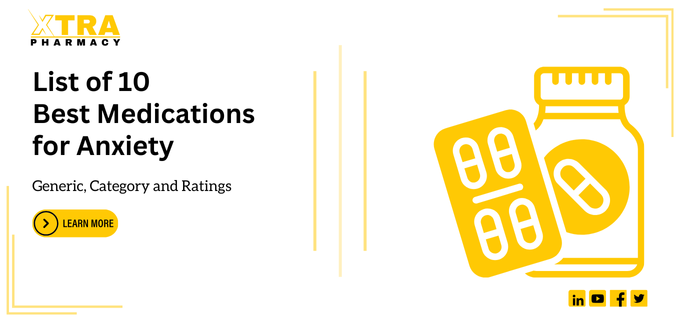Understanding Anxiety and the Need for Treatment
Effective management of anxiety requires recognizing the symptoms and seeking a appropriate and best medications for anxiety and one of those ways is through finding the treatment
If you’re dealing with anxiety, you’re not alone. It’s a pretty common mental health condition that can somehow impact your daily life. Its common symptoms involves feelings of worry, fear, and uneasiness, usually a prevalent mental health condition behind it.
Commonly Prescribed Best Medications for Anxiety
There are several types of commonly prescribed best medications for anxiety. Each type works differently to reduce symptoms, and understanding these differences can help in making better treatment decisions.
Selective Serotonin Reuptake Inhibitors (SSRIs): Prescribed to treat Generalized anxiety disorder, panic disorder, OCD, social anxiety disorder, and PTSD. They increase serotonin levels in the brain to regulate mood and anxiety.
Serotonin-Norepinephrine Reuptake Inhibitors (SNRIs): Prescribed for similar conditions as SSRIs, but are used when SSRIs are ineffective or for comorbid depression. They increase both serotonin and norepinephrine levels to alleviate anxiety symptoms.
Benzodiazepines: Provide short-term relief of acute anxiety symptoms and panic disorder. They enhance the activity of GABA, providing rapid relief of symptoms. However, they have a high risk of tolerance and dependence.
Buspirone: Used to treat GAD and as an alternative to benzodiazepines. It is less sedating and has a lower risk of dependence. It acts as a partial agonist of serotonin receptors.
Beta-Blockers: Used to treat performance anxiety, situational anxiety and as adjunctive therapy for other anxiety disorders. They block the effects of adrenaline, reducing physical symptoms of anxiety.
Tricyclic Antidepressants (TCAs): Used for treatment-resistant cases of anxiety disorders when other medications have been ineffective. They increase both serotonin and norepinephrine levels but are rarely prescribed due to their side effect risks and potential for overdose.
Each medication type carries its own set of advantages and drawbacks. The choice depends on factors such as the specific anxiety disorder, patient preferences, and the presence of comorbid conditions. It’s essential to consult with a healthcare provider to determine the most suitable treatment approach while considering individual needs and potential risks.
List of best Medications for Anxiety
After a quick introduction of most prescribed types of anxiety medication, you are quite capable of choosing the best medications for anxiety.
Generic Names, Category and Ratings:
| GENERIC NAME | USER RATINGS | CATEGORY |
|---|---|---|
| Escitalopram (Lexapro) | 3.5/10 | SSRIs |
| Lorazepam (Ativan) | 6/10 | benzodiazepines |
| Diazepam (Valium) | 7/10 | benzodiazepines |
| Alprazolam (Xanax) | 8/10 | benzodiazepines |
| Clonazepam (Klonopin) | 5.5/10 | benzodiazepines |
| Duloxetine (Cymbalta) | 4/10 | SSNIs |
| Sertraline (Zoloft) | 3/10 | SSRIs |
| Silenor (doxepin) | 3.5/10 | Tricyclic Antidepressants |
| Citalopram (Celexa) | 3/10 | SSRIs |
| Fluvoxamine (Luvox) | 2/10 | SSRIs |
What Deficiency Causes Anxiety?
There could be various causes for anxiety, including genetics, environment, and life experiences. Buying best medications for anxiety alone isn’t the perfect solution. We should be aware of nutritious gaps that could be filled to support medication success. Nutritional deficiencies that contribute to anxiety symptoms are:
Low levels of magnesium affect neurotransmitters and regulate stress response in the brain.
Deficiencies in certain B vitamins, such as B6, B9 (folate), and B12, can impact mood regulation and neurotransmitter synthesis.
Insufficient levels of omega-3 fatty acids, especially EPA and DHA, found in fish oil, have been linked to anxiety and mood disorders.
Vitamin D deficiency can affect mood regulation and neurotransmitter function. It’s important to maintain a balanced and nutritious diet and consult consulting with an experienced dietitian or healthcare expert for personalized advice on identifying potential deficiencies and making dietary changes or supplementation to support mental health.
Conclusion: Finding the Right Medication for Your Anxiety
We have already covered every aspect of the most popular and successful medicines available for anxiety. If you want them delivered to your home, you can browse the best medications for anxiety available on our online pharmacy. It is preferred that you talk to a therapist, change your lifestyle, and seek support from healthcare professionals. By doing this, you can find the right treatment for you.
Well, we’ve reached the end of this blog, and I hope you feel confident about selecting the best medication to manage anxiety effectively and improve your overall quality of life. If you have any queries, leave a comment below. Our healthcare experts would be happy to help you.
FAQ’s:
When should you take medication for anxiety?
Medication for anxiety should be taken as prescribed by a healthcare provider, typically when symptoms significantly impact daily functioning.
What is the best medication for anxiety with the least side effects?
The best medication for anxiety with minimal side effects varies per individual, but Benzodiazepines like Alprazolam (Xanax) are commonly prescribed.
What is the first drug of choice for anxiety?
Choosing the best medication for anxiety depends on several factors, such as the type and severity of the disorder, the patient’s medical history, and individual preferences. SSRIs are usually the first medication prescribed for anxiety disorders.
What is the new medication for anxiety?
There are constantly new medications being developed and approved for anxiety treatment, Some latest released medications are clonazepam (Klonopin) and diazepam (Valium).
Does calm magnesium help with anxiety?
Some people find that magnesium supplements like Calm can help reduce symptoms of anxiety, but results vary from person to person.
What is a drug that calms you down?
Benzodiazepines such as Xanax or lorazepam are fast-acting medications commonly used to provide immediate relief from acute anxiety episodes.

